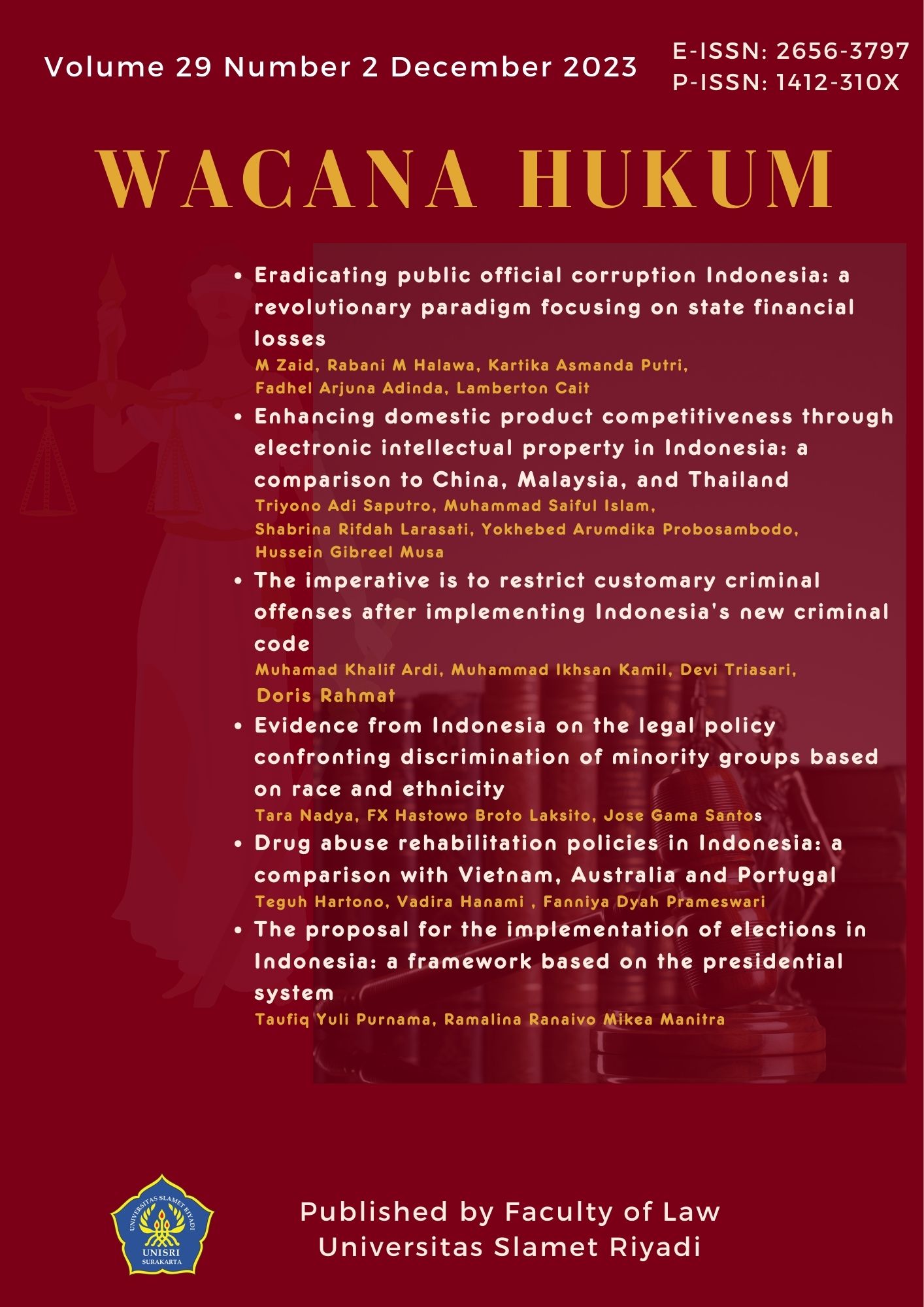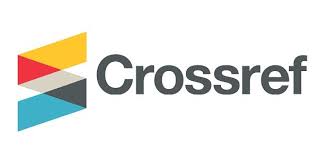Enhancing domestic product competitiveness through electronic intellectual property in Indonesia: a comparison to China, Malaysia, and Thailand
DOI:
https://doi.org/10.33061/wh.v29i2.9577Keywords:
Intellectual property registration; economic law; local product;Abstract
The urgency of the protection of domestic products in supporting economic value and increasing market competitiveness plays a large role through the registration of intellectual property rights (E-IPR). The existence of intellectual property in providing legal security for domestic products was essential for its certainty and safety. This should be done asa precaution in anticipation of unhealthy business rivalries and a minimizing of counterfeit products in the market. The methods used in supporting this study through normative research using a constitutional and case approach. Additionally, it sustained the legal source from primary and secondary data and was analyzed using descriptive analysis methods. The purpose of research is to determine the extent to which intellectual property rights protection has played in supporting the success of domestic products in the market. In view of the high presence of domestic products, the intellectual property rights registration is required by governments and stakeholders through the creation of domestic products to ensure early legal awareness of the resulting creativity needed to protect them by intellectual property. The implementation of intellectual property e-rights (E-IPR) is part of the economic laws of development because it includes efforts to enhance and develop domestic products and thus protect the state, improve the competiting power of the product, and create social welfare.
References
Balqis, Wizna Gania, ‘Perlindungan Merek Sebagai Hak Kekayaan Intelektual: Studi Di Kota Semarang, Indonesia’, Journal of Judicial Review, 23.1 (2021), 41 <https://doi.org/10.37253/jjr.v23i1.4360>
Basuki Antariksa, ‘Landasan Filosofis Dan Sejarah Perkembangan Perlindungan Hak Kekayaan Intelektual: Relevansinya Bagi Kepentingan Pembangunan Di Indonesia’, Jurnal Ekonomi Kreatif, 1.1 (2012), 1–21
Cahyadi, Indra, Budi Muliawan, Universitas Al, Komplek Masjid, Agung Al, Jalan Sisingamangaraja, and others, ‘EFEKTIVITAS DAN EFISIENSI PENEGAKAN HUKUM TERHADAP ASPEK-ASPEK EKONOMI DI INDONESIA ( Berdasarkan Teorema Coase Dan Pemikikan Posner ) Mustaming Daeng Matutu , Selayang Pandang Tentang Perkembangan Type-Type Negara Modern ( Cetakan Ke-II ), Ujung Pandang’, Jurnal Magister Ilmu Hukum (Hukum Dan Kesejahteraan), IV.1 (2019) <https://jurnal.uai.ac.id/index.php/JMIH/article/view/757/537>
Dakhoir, Ahmad, ‘Eksistensi Usaha Kecil Menengah Dan Pasar Tradisional Dalam Kebijakan Pengembangan Pasar Modern’, Jurnal Studi Agama Dan Masyarakat, 14.1 (2018), 31 <https://doi.org/10.23971/jsam.v14i1.783>
Darwance, Darwance, Yokotani Yokotani, and Wenni Anggita, ‘Dasar-Dasar Pemikiran Perlindungan Hak Kekayaan Intelektual’, PROGRESIF: Jurnal Hukum, 15.2 (2020), 193–208 <https://doi.org/10.33019/progresif.v15i2.1998>
Diantha, I made pasek, Metode Penelitian Hukum Normatif Dalam Justifikasi Teori Hukum, ed. by Winatsari, I (Jakarta: PT Interfajar Pramatama Mandiri, 2016)
Elli Ruslina, ‘Makna Pasal 33 Undang-Undang Dasar 1945 Dalam Pembangunan Hukum Ekonomi Indonesia’, Jurnal Konstitusi, 9.1 (2012), 49–82
Harini, Cicik, and Yulianeu Yulianeu, ‘Strategi Penetrasi Pasar UMKM Kota Semarang Menghadapi Era Pasar Global MEA’, Jurnal Ekonomi Dan Bisnis, 21.2 (2018), 361–81 <https://doi.org/10.24914/jeb.v21i2.1967>
Jateng, Kanwil, ‘SOSIALISASI PENTINGNYA PENDAFTARAN MEREK BAGI UMKM DI KABUPATEN TEGAL’, Kanwil Jateng, 2019, p. 1 <https://jateng.kemenkumham.go.id/berita-kanwil/berita-upt/4006-sosialisasi-pentingnya-pendaftaran-merek-bagi-umkm-di-kabupaten-tegal> [accessed 29 October 2022]
Marlina, Neny, ‘Eksistensi Potensi Lokal Dalam Fenomena Glokalisasi: Belajar Dari Batik Kayu Krebet’, Jurnal Ilmu Pemerintahan, Volume 8 (2015), 110
Murni, Murni, ‘Analisis Ekonomi Terhadap Pasal-Pasal Hukum Persaingan Usaha Dalam Undang-Undang Nomor 5 Tahun 1999’, Arena Hukum, 5.1 (2012), 21–30 <https://doi.org/10.21776/ub.arenahukum.2012.00501.3>
Nizwana, Yulia, and Rahdiansyah Rahdiansyah, ‘Perlindungan Hak Kekayaan Intelektual (HaKI) Ditinjau Dari Epistimologi’, UIR Law Review, 3.2 (2019), 34
Nugroho, Sigit, ‘Perlindungan Hak Kekayaan Intelektual Dalam Upaya Peningkatan Pembangunan Ekonomi Di Era Pasar Bebas Asean’, Supremasi Hukum: Jurnal Penelitian Hukum, 24.2 (2017), 164–78 <https://doi.org/10.33369/jsh.24.2.164-178>
Pradana, Mahir, and Avian Reventiary, ‘PENGARUH ATRIBUT PRODUK TERHADAP KEPUTUSAN PEMBELIAN SEPATU MEREK CUSTOMADE (STUDI Di MEREK DAGANG CUSTOMADE INDONESIA)’, Jurnal Manajemen, 6.1 (2016) <https://doi.org/10.26460/jm.v6i1.196>
RI, DPR, Undang-Undang No. 20 Tahun 2016 Tentang Merek Dan Indikasi Geografis, 2016, pp. 1–74 <https://peraturan.bpk.go.id/Home/Details/37595/uu-no-20-tahun-2016>
Rismana, Daud, and Hariyanto, ‘LEGAL PROTECTION OF INTELLECTUAL PROPERTY RIGHTS: WHAT IS URGENCY FOR THE BUSINESS WORLD?’, Jurnal IUS Kajian Hukum Dan Keadilan, 9.1 (2021), 96–111 <https://jurnalius.ac.id/ojs/index.php/jurnalIUS/article/view/818>
Riwanto, Nanda, ‘EKSISTENSI MEREK JASA TERKENAL DALAM HUKUM NASIONAL DAN INTERNASIONAL’, YUSTISIA MERDEKA : Jurnal Ilmiah Hukum, 6.1 (2020) <https://doi.org/10.33319/yume.v6i1.44>
Ruslina, Elli, ‘ASAS KEBERSAMAAN DAN KEKELUARGAAN SEBAGAI DASAR PEMBANGUNAN HUKUM EKONOMI INDONESIA’, Jurnal Hukum Sasana, 5.2 (2020), 163–81 <https://doi.org/10.31599/sasana.v5i2.99>
Sedyastuti, Kristina, ‘Analisis Pemberdayaan UMKM Dan Peningkatan Daya Saing Dalam Kancah Pasar Global’, INOBIS: Jurnal Inovasi Bisnis Dan Manajemen Indonesia, 2.1 (2018), 117–27 <https://doi.org/10.31842/jurnal-inobis.v2i1.65>
Sinaga, V. Selvie, ‘Faktor-Faktor Penyebab Rendahnya Penggunaan Hak Kekayaan Intelektual Di Kalangan Usaha Kecil Menengah Batik’, JURNAL HUKUM IUS QUIA IUSTUM, 21.1 (2014), 61–80 <https://doi.org/10.20885/iustum.vol21.iss1.art4>
Sofyarto, Karlina, ‘Perlindungan Hukum Hak Kekayaan Intelektual Atas Pengetahuan Tradisional Terhadap Perolehan Manfaat Ekonomi’, Kanun Jurnal Ilmu Hukum, 20.1 (2018), 149–62 <https://doi.org/10.24815/kanun.v20i1.9832>
Sutra Disemadi, Hari, and Cindy Kang, ‘Tantangan Penegakan Hukum Hak Kekayaan Intelektual Dalam Pengembangan Ekonomi Kreatif Di Era Revolusi Industri 4.0’, Jurnal Komunikasi Hukum (JKH), 7.1 (2021), 54 <https://doi.org/10.23887/jkh.v7i1.31457>
Al Wakhidah, Hijriyah, ‘UMKM Soloraya Antusias Patenkan Merek Produk, Berharap Pemerintah Beri Kemudahan’, Solopos, 2020, p. 1 <https://www.solopos.com/umkm-soloraya-antusias-patenkan-merek-produk-berharap-pemerintah-beri-kemudahan-1074556>
Wauran-Wicaksono, Indirani, ‘Hak Kekayaan Intelektual Sebagai Benda: Penelusuran Dasar Perlindungan Hki Di Indonesia’, Refleksi Hukum: Jurnal Ilmu Hukum, 9.2 (2015), 133 <https://doi.org/10.24246/jrh.2015.v9.i2.p133-142>
Widyanti, Yenny Eta, and Universitas Brawijaya, ‘THE URGENCY OF SUI GENERIS PROTECTION OF COMMUNAL INTELLECTUAL PROPERTY IN INDONESIA : A Comparative Study in Philippines Yenny Eta Widyanti’, 13.1 (2022), 1–23 <https://doi.org/10.18860/j.v13i1.16467>
Downloads
Published
How to Cite
Issue
Section
License
Copyright (c) 2023 Triyono Adi Saputro, Muhammad Saiful Islam, Shabrina Rifdah Larasati

This work is licensed under a Creative Commons Attribution-ShareAlike 4.0 International License.
Authors who publish with this journal agree to the following terms:
- Copyright on any article is retained by the author(s).
- The author grants the journal, the right of first publication with the work simultaneously licensed under a Creative Commons Attribution License that allows others to share the work with an acknowledgment of the work’s authorship and initial publication in this journal.
- Authors are able to enter into separate, additional contractual arrangements for the non-exclusive distribution of the journal’s published version of the work (e.g., post it to an institutional repository or publish it in a book), with an acknowledgment of its initial publication in this journal.
- Authors are permitted and encouraged to post their work online (e.g., in institutional repositories or on their website) prior to and during the submission process, as it can lead to productive exchanges, as well as earlier and greater citation of published work.
- The article and any associated published material is distributed under the Creative Commons Attribution-ShareAlike 4.0 International License

















.png)


